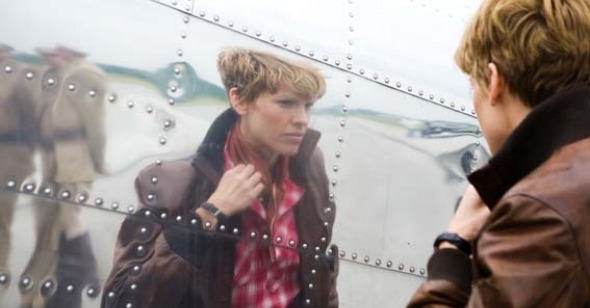Plain Ride
by Michael Koresky
Amelia
Dir. Mira Nair, U.S., Fox Searchlight
Mira Nair’s Amelia Earhart biopic Amelia will easily be criticized for simply being the kind of film that it is. And you’ll know the type from the very opening, when an awestruck pubescent Amelia Earhart stands in a golden wheat field, brushing her hands against the whipping grains, staring up at the sky with dewdrop eyes while a voiceover states elegiacally, “When I saw that little plane, it lifted me above the Kansas prairie.” Yes, we’re in glittering, hagiographic territory, ripe with nostalgia: every time a plane soars, the traditional score by Gabriel Yared will swell; scenes will frequently dissolve to “inspiring” blinding brightness; many suited men will explicitly tell Amelia (Hillary Swank) that her dreams of flying around the world, by Jove, “cannot be done!” which she’ll refute with can-do cheeriness.
Yet just because Amelia will be dismissed by many solely on its tacit admission of its own old-fashioned genre makeup doesn’t mean it deserves sympathy, despite its good-natured deployment of these tropes. Amelia comes across as the kind of dispassionate Hollywood “property” that was made with little interest or fervor and that only in retrospect forces its makers to backpedal and wax rhapsodically about how inspired they were by its subject. Unsurprisingly Amelia seems utterly impersonal, both because of its predictable aesthetic approach to biography and because a film about Amelia Earhart seems so rote and unnecessary. Without some sort of radical approach to the material—either a purely sensory, all-action experience in the mind of the daring aviatrix, or perhaps, a film that eschews flying sequences completely to focus on her plain ground life—there doesn’t seem to be much motivation, outside of award-reaping, behind its production.
Fittingly the film isn’t remotely interested in trying to understand Earhart’s motivations, either. Other than those early scenes of a young Amelia looking up at the great blue beyond and a few dispersed high school diary-ish comments from screenwriters Ron Bass and Anna Hamilton Phelan like, “The sky is a safe, beautiful place where everything’s comprehensible,” the film doesn’t deign to discuss what drove Earhart’s hunger for flight—its lack of probing foregrounded in its very first scene of dialogue, when she tells George Putnam (Richard Gere), her new publicity manager and future husband, that she doesn’t need to spell out her reasons. The refusal to psychoanalyze this historic figure is a noble one, but it also leaves its central figure, who by all rights should be a fairly fascinating one, a cipher.
To fill in the gaps, Swank trots out a succession of toothy, freckly grins and chirrupy expressions of Annie Get Your Gun–ish gumption that are ingratiatingly warm and lively but also make her performance seem largely superficial, as though based primarily on extant snapshots of the aviatrix posing and waving gleefully in front of planes. For his part, Gere trots out his Chicago-honed Jimmy Durante nasality (when he calls Lindbergh a “stiff-ass sanctimonious prude!” I half expected him to break out the Kander-and Ebb jazz hands) and his adorable overbite (together, the smiling Swank and Gere often look like two bunny rabbits mating—add in the famously mile-wide smile by Ewan McGregor, as aviation pioneer Gene Vidal, and you have a downright dental drama). The actors struggle mightily against a soporifically conflict-free script, but they can’t help but be dragged down in the end; even Earhart’s most perilous flights generate little suspense, as they’re simply build-ups to the final fateful mission we all know about from the outset.
Nair’s refusal to employ CGI in those flight sequences in favor of traditional aerial photography does, however, finally grant the film some measure of visual beauty and conceptual respectability. The last half-hour, overlaid with expected portent, is at least persuasive in its portrait of the arduousness of her final self-imposed task, and even occasionally lyrical when it casts off the weight of biopic realism. There’s a lovely image of nighttime moon and clouds that’s downright storybookish, and which points to the surreal tale of wonder Amelia might have been. Instead we’re left with lines like, “I wanna be free . . . to be a vagabond of the air.” Amelia keeps trying to impress us with its protagonist, forgetting that we were impressed before we sat down in the theater, and now we’re craving something more.
